TR Interview: David Cross and Todd Berger on It’s a Disaster
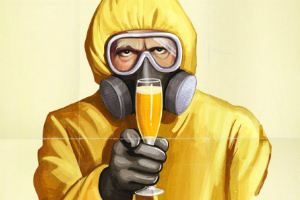 |
Perhaps it’s only natural for the era before and after the fake Mayan apocalypse, but end-of-the-world comedies are in these days. Last year brought Seeking a Friend for the End of the World, while this year brings Seth Rogen’s This Is the End and Edgar Wright’s The World’s End.
But there’s an underdog in this army of armageddons – It’s a Disaster, starring David Cross and Julia Stiles, which opens in theaters tomorrow. I first had a chance to see it a year ago at the Los Angeles Film Festival, when it was unclear when or if distribution would happen. Now that it’s on the way to audiences everywhere, I can finally post my interviews from June of 2012 with David Cross and director Todd Berger. You may notice a slightly dated reference or two in the conversation.
Up first is Berger, who also cameos in the movie as the guy in the hazmat suit seen in the drawing above.
Luke Y. Thompson: You said the couples in the movie are all based on the eight stages of grief. Most of us know only five. How did you come up with eight?
Todd Berger: A lot of creative Googling. I initially found five. After searching some more, I – those are the classic five. Then, after researching some more, I found seven. Finally, because I needed eight, I kept looking and looking and then I found what I think was a more religious Christian-themed website that actually was promoting eight stages. I believe the one they added was hope. In the actual stages of grief, I don’t believe hope is included, because when you find that you’re going to die, I don’t know if they want you to have too much hope. It’s probably not going to happen. But in this religious one, where it’s always a possibility that God might show up and cure whatever horrible diseases you have, I guess hope was one of the crucial stages. So I then took those eight stages and turned those into the characters of the film.
LYT: Hope is for a healing miracle, rather than a life in Heaven?
TB: Yeah. I hadn’t thought about it that way.
LYT: Was that always integral to the story you wanted to tell? Did that come after the basic idea?
TB: I came up with that before I even started writing the script. I started knowing I wanted these four different couples at four different stages in the relationship. Then, I said, “Well, I have eight characters. I’m not going to have really any other characters in the movie. So I need to figure out how to differentiate them.” So even when you’re reading it – because I understand once you get actors, the actors will be able to put their own spin on the character. On screen, you’ll be able to tell who’s who. But it was very important to me to say, “Oh, when you’re reading the script, the eight characters need to actually seem different. They need to all react differently to the disaster.” I thought long and hard about how to do this. That’s when it hit me.
And I went through several numbers of things. Like, “what about the seven dwarfs? Or, what about the seven deadly sins?” I kind of went through a list of things I could think of, thinking, “Hey! What would actually make sense for the characters?” That’s when I hit the stages of grief. And I thought, “Oh! Perfect!” The more I read about it, the more I thought, “Oh, this is absolutely how these people, eight different kinds of people, would react to this situation.”
LYT: While coming up with this movie, were you aware there would be this trend of apocalypse comedies, like Seeking a Friend for the End of the World, and Seth Rogen and Evan Goldberg’s This Is the End?
TB: No! And now, there’s the Simon Pegg one? No! Not at all. I wrote this script, and actually…I wrote another script a few years ago that maybe I’ll make one day. It’s more of a Mad Max, post-apocalyptic comedy, set years after the world ended. I’ve always been fascinated with the topic. I wrote this, and I’d actually been meeting with America Ferrera. We were having lunch the first time we met, and she brought up Seeking a Friend for the End of the World, which was a script she had read. I was like, “What’s that?” She said, “Oh! It’s a movie about a comet that’s going to hit the Earth.” I had not heard of it. I saw a movie in the late ’90s, I believe it was called Last Night. When I heard about the plot for Seeking a Friend for the End of the World, I said, “Oh! That sounds like Last Night!” And I remember really liking Last Night, about what would you do if it were your last night on Earth. That always stuck with me as this cool idea. We always talk about…if you had one day left, what would you do? If you knew you were going to die in a week, what would you do? Those were the topics.
But really, this was all inspired because I wanted to make a zombie movie about people trapped in a house. Then I decided zombies were kind of such in the zeitgeist right now, and Shaun of the Dead so perfectly satirized zombie movies, I said, “Well, that’s been done. Let’s think of something else that we force people to stay inside of the house.” And I said, “Oh! A disaster, a post-apocalyptic disaster would do that.” It was very important that they had to stay inside the house. It couldn’t be an earthquake. It couldn’t be a hurricane. It couldn’t be anything that would allow them to open the door and see what was going on, because we didn’t have the budget for that.
LYT: Did you ever see Right at Your Door?
TB: Oh, yeah! That was a huge inspiration. I told the whole cast to watch it. I actually watched it a couple weeks before we started shooting. I hadn’t watched it in a while. I think I saw it in the theatre, and I always loved it. I actually wrote a new scene into the movie, because the different thing in Right at Your Door is that his power stays on for most of the movie, and his phone line stayed on for most of the movie. It keeps going in and out. It stops working for a while. Then, it starts working again.
That’s when I came up with this idea that there’d be this scene in the movie, and into the bathroom, where the phone line just suddenly starts working again, and they get a random phone call. Because when I was watching Right at Your Door, it was like, “Oh, yeah! That’s so awesome when their phone starts ringing out-of-nowhere, and it turns out to be his wife’s mother wanting to know what’s going on.” I thought, “That could make for a really funny scene if instead of your wife’s mother, it’s a Filipino telemarketer calling to try to sell you life insurance.” To me, that whole joke comes from…I was sitting at a bar once with some people. We look over at the TV, and there had been some horrible massive quake in India or some place. We were all like, “Oh, look! There’s an earthquake! 18,000 people were killed. Anyway, have you guys seen the new X-Files episode?” It was irrelevant because it was out-of-the-country. It was far, halfway across the world. Of course, it became a news story. But we hear about all these things all the time, horrible disasters happening in other parts of the world. We all think about it for two seconds and move on, because it’s in some other country across the world. That was the inspiration for these jokes: that while there are horrible disasters happening to us, there are people in the Philippines who are barely paying attention and really don’t give a shit.
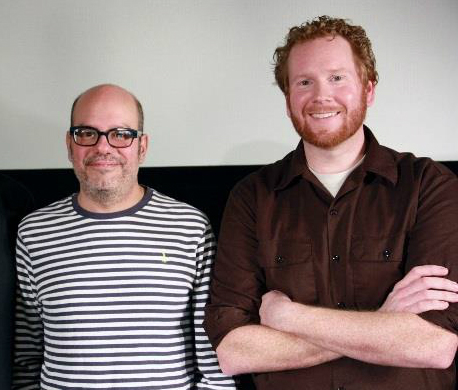 |
LYT: You said earlier that the end of the world theme has been something you’ve been interested in for a long time. Can you trace it back to anything? Is it like seeing The Day After in the ’80s? Can you trace it back to a specific event?
TB: I loved The Road. Sorry, not The Road. I do love The Road, but I didn’t read it as a child. I love the Mad Max movies. I really like A Boy and His Dog. That movie always stuck with me when I was younger. I think I saw Mad Max Beyond Thunderdome first when I was a kid, and then realized later on that the first two were far superior in their quality. I don’t know. The genre’s always kind of stuck with me as being…and honestly, I read The Stand when I was probably 13 or 14 years old. That’s also, I believe, when they had that mini-series on ABC. That always really stuck with me. I always loved the idea of 99% of the world dying, and there are only a few random survivors who get to randomly walk around America and pick up the pieces and deal with it. Of course, that one goes off the rails with good versus evil. Still, the idea of this epic novel about the last few people on Earth always fascinated me. That stuck with me a lot.
LYT: That’s coming back as a movie, too.
TB: I heard that! That’s going to be amazing, I hope. Who’s doing it?
LYT: I don’t know. They were talking about Ben Affleck directing at one point. I don’t know if that’s still the deal.
TB: Really? That could work. I dunno. I’m excited about Argo.
LYT: Yeah, definitely. It’s got a good trailer. Once you wrote the script, how did everything come together after that?
TB: I’m in a comedy group with three of the guys from the movie: Kevin Brennan, Jeff Grace and Blaise Miller. I wrote this script to be something all in one location, and there are only 11 characters in the entire movie. Mostly, only eight. I wrote it to be something we can go shoot incredibly cheap and over a few weekends. I was thinking, “We’ll shoot it at my house. We’ll get some 5Ds, and we’ll just do it.” So, I sent them the script. They all read it. They said absolutely. We had met Julia Stiles a few years earlier, through a friend of a friend. We shot a viral video with her, called “Julia Stiles Styles,” where she creates an eco-friendly fashion line. We had remained friends with her. When the guys read the script, Jeff said, “Why don’t we send it to Julia, and see if she’d be interested in playing one of the parts, for fun?” We said, “OK.” We sent it to her. She read it in a couple days, and wrote us back, and said, “I love this. I want to be in it. I will absolutely do it. But I’m doing a play on Broadway, and I can’t shoot for six months.”
At first, we were like, “Oh, no! We have to wait six months, but then we can roll. Wait! No! But then I’ll get the six months to see maybe we can see who else we can get for this.” We asked Julia, “Are there any actresses or actors that you would recommend, that you would either want to work with or are friends with?” She always wanted to work with America Ferrera. We sent the script to America, who read it and loved it, and said I’m in. She recommended David Cross. We said, “Oh! Absolutely. We’re huge fans.” We sent it to him. He read it and loved it. At that point, we found that, “Oh, with these other people attached, we can go to some actors and actresses that we like.” I’m a huge Children’s Hospital fan, and that’s why we went to Erinn Hayes, and she was on board. I saw Rachel Boston in an indie called The Pill that played around festivals last year, that I thought was super-funny. We went to her. Everybody just read the script and dug it, and signed on. The next thing you know, we had amazing people in a house for two, three weeks.
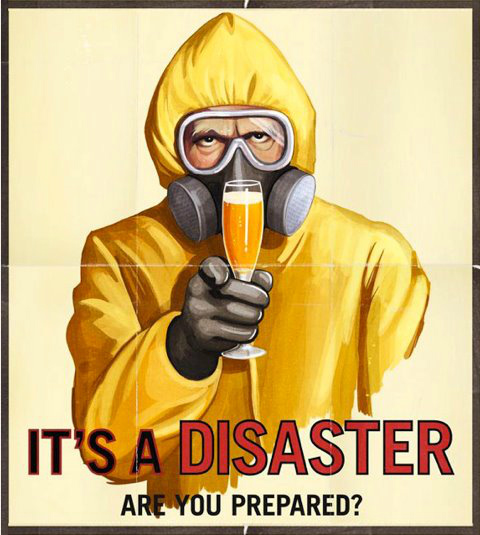 |
LYT: When you put David Cross and Julia Stiles together as a couple, is that a case of putting the two biggest names together, or was it giving Julia Stiles the most unlikely romantic lead that we can think of acting-wise?
TB: Exactly. The reason I think she was drawn to the script, and really the reason all of them were drawn to the script, was that all of them got to play a character they don’t normally play. Julia was drawn to it because she played this neurotic, Woody Allen-esque kind of loser of a character, which is something she doesn’t often get to do. She thought that was really funny. “I’d like to do that.” David’s character, being the comedic straight man, was something that he doesn’t often get to do. Normally, he plays wild, over-the-top characters. When he read the script, he really responded to it. He told me, “I don’t really get offered a part where I’m a normal guy very often.” He really responded to that. We had already sort of cast Kevin as Buck, Jeff as Shane and Blaise as Pete because those are their strengths as performers. I wrote it for those guys. Really, it was casting the fourth guy. We knew specifically what we wanted to cast in the guy, and he happened to be the one in the relationship with Julia. It kind of just ended up that way.
LYT: You describe him as a normal guy, but the character really isn’t a normal guy.
TB: Yeah. Without spoiling too much, he has to be the voice of reason that you, the audience, sympathize with, and feels that you’re seeing the movie through his eyes. Also, there is a twist in the movie that is crucial that David and everyone in the cast could handle. I was absolutely 100% confident that the twist that happens in the movie is something that David could do. I think he was very successful at it.
LYT: This seems like a movie where I felt your post-screening Q&A enlightened a bunch of things and made me want to see it again to see what I missed. Do you feel that turn he takes, there are clues earlier about? It’s set up that Julia’s character has a bad track record with men. I don’t remember if there were any sorts of hints that he might not be all that he seems early on.
TB: There are. Actually, that was all David’s idea. When we met about it, he said…and all the actors did this: he informed a lot of the subtle touches in his character. He wears a LIVESTRONG bracelet the entire movie, because David thought this guy would wear a LIVESTRONG bracelet. No one ever asks, “Why are you wearing a LIVESTRONG bracelet?” He just is. There are several references to the script of the movie that are laid in earlier with the action, that by the dime, David said, “The first time you watch this movie, I don’t want you to suspect anything. Then, the second time you watch it, you’re going to say, ‘Oh! Of course!'” I don’t want to give too much away. But I’ll tell you there’s a scene early on where they’re talking about the University of Texas football team, and someone throws up a “Hook ’em Horns.” David’s character says, “No, that’s a devil sign.” Everybody laughs, thinking that he’s just making a joke. But maybe he’s not. There are a couple moments like that, scattered throughout the movie, where you think he’s making a joke about something. However, if you watch it again, you’re like, “O-o-o-oh! Maybe not.”
Next page: David Cross speaks!
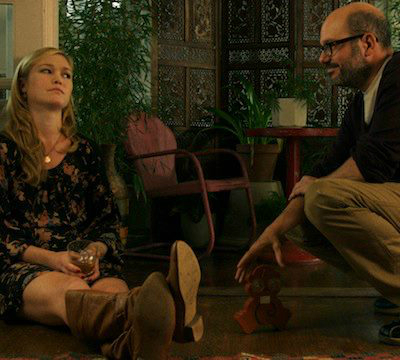 |
LYT: How did you come to It’s a Disaster in the very beginning?
David Cross: America Ferrera gave me the script.
LYT: Did it resonate with you right away?
DC: Not in the grander scheme of things, but in a self-centered way. It was a very funny, sharp script where the laughs came honestly and interestingly, and that combined with a character I don’t often get to play. Those two things resonated with me at first, in the sense of looking at it from a “Do I want to do this movie or not,” and not so much “Is this a good script or not?”
LYT: How close to the final film was this script? Was it very different? Did you guys change a lot of it after you came on-board?
DC: No, no. I think it was very close. Obviously, some scenes were improvised within set parameters. There was a lot of improv because of the nature of people overlapping, and talking over themselves. But it’s really very close to the script. That’s pretty much what was on the page.
LYT: When you have that many people improvising and talking over themselves, does that make it very difficult for post-production? Was there a lot of looping?
DC: You’d have to ask the filmmaker that. I wasn’t part of the post at all. I did five or six ADR lines, maybe. I think there were some sound issues, and that’s why we did it. He chose to include the overlaps in there so he could just choose his take. He could fudge it a bit by overlapping the audio over somebody’s track. But in the very beginning, he kind of does the equivalent of an audio rack focus in this one scene, where you’re kind of concentrating on somebody, or a couple’s dialogue is more in the foreground as it were, and he keeps going back and forth. They kind of got away with it. Not away with it, but he figured out a way to do it.
LYT: I know a couple of scenes, like the opening one, were really long takes. Is that nerve-wracking? Is it fun? Is it both?
DC: Both. It’s one of those things that’s very satisfying when you do it, you’ve got it done, and it works. I think we did that opening nine times. That one take is like ten minutes long. There’s so much that can go wrong on any shot. Whether an actor doesn’t hit their lines, if somebody’s out of focus, if the audio’s clean, if the camera shoots off-set for a second, if there’s noise from outside, or if somebody doesn’t hit their mark. There’s so much that can go wrong. I think that one took about nine takes. But it’s fun. It’s cool. And it works great.
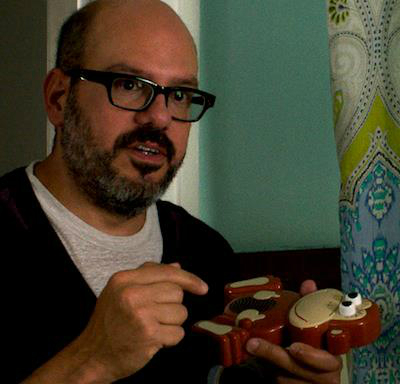 |
LYT: It’s a Disaster was one of the movies that, after the Q&A, I wanted to go back and see it again, because there was so much layered in there I hadn’t caught the first time. With your character specifically, there’s a big revelation at a certain point. It’s set up with what you know about his past relationship. Are there hints earlier that his facade is cracking a bit, and he’s not quite what he seems to be?
DC: Definitely. If you go back – we had a whole bunch of them. And Todd, when he was in post, decided what to keep, what to lose and what to keep subtle. There are little hints throughout the movie of what my character is really about.
LYT: Todd talked about how he used his understanding of grief to form the characters. Was that something you were aware of from the beginning, or did he tell you afterwards?
DC: What I’m thinking from our conversation at the premiere, it sounds like something he did tell me, but I then immediately forgot. He seemed to imply we had had that discussion. When he said it, I was like, “Oh, yeah! That sounds kind of familiar.” I wouldn’t say it really informed my character at all. But he directed me and us, so he was getting what he needed to get.
LYT: How in-depth did you guys sit down and discuss the character beforehand? Did you have a lot of freedom to come up with the character? Did he have some very specific ideas he wanted you to play with?
DC: Both. We did meet kind of in a director-potential actor way, at a bar, and talked at length. But it’s not like we went through some backstory about Glen and his history and created a fictional biography for him. We didn’t do that. It was just talking about it. I may’ve had some ideas and threw some things out there, but it was nothing major. I wear a LIVESTRONG bracelet throughout the movie. I was like, “Hey, this guy seems like he would have a LIVESTRONG bracelet.” Just shit like that. Nothing major at all. Just…little dashes of spice.
LYT: He also said that all the couples went out on fake dates beforehand. What did you guys do for that?
DC: They weren’t fake dates. The actors who were paired together hung out together, so that they would be comfortable on-camera. We had no time in the budget to rehearse. We started shooting, and that was it. We rehearsed on camera maybe once, and then shot it. And we’d only have a few takes, so we wanted to make sure that we were comfortable with each other before we started that process. Everybody hung out maybe two, three, four times. Julia and I met, I think, twice. She lives down the street from me, or lived down the street from me, in New York. But we hung out. It was probably less important for us, because we were only on our third date. It was a smart thing to do, especially because we were so underly done and limited with how much time we had.
LYT: When we talked at the premiere, you mentioned you weren’t aware of all these indie apocalypse comedies coming out. With or without that in mind, do you think there’s something specific about that movie that taps into the mindset right now?
DC: Not at all. As you might expect, I’ve been asked that a lot. There are a number of…Seeking a Friend at the End of the World. What else is there?
LYT: There’s one that Danny McBride and Seth Rogen are doing, where they play themselves.
DC: Yeah. But they’re just trying to get a deal for that idea, right? I don’t know. You might know better than me.
LYT: I think they’re shooting that one. This is the End, it’s called.
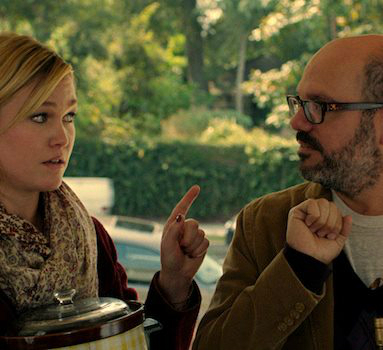 |
DC: That’s the other thing. I don’t see this as a disaster film in any way whatsoever. It’s just a writer’s contrivance to put all these people in this room, and have them witness this important, life-altering event taking place outside. As you saw, you never see it. You only allude to it. We believe it’s real, but we don’t see any…it doesn’t feel like a disaster film in any way, shape or form, except for the title and the thing that’s happening outside that we never see. It’s almost like a weird, existentialist one-act. I really don’t see it as fitting that category. It’s not even scary. It’s an extremely low-budget indie approach to a disaster movie. There’s no zombies, or terrorists or anything. You never see that. You believe it, but it’s just alluded to.
LYT: You’ve done a lot of voice-over work over the years. I recently interviewed Maurice LaMarche, and was surprised to hear that, even though he’s such an amazing and well-known voice, he still has to audition for roles. Do you still have to audition for animation voice-overs?
DC: That’s amazing he would have to audition. I don’t get that stuff. I’ve auditioned for spokesman stuff, which completely makes sense. There’s a client somewhere who may not be familiar with my work, who needs to hear if I’m right to be the voice of Dodge trucks, or whatever. Though they have a thing where they pay you to audition now. Like, a small amount of money you get to go in and audition for 30 minutes? Usually, with that, they’re just making sure, I guess. I don’t know. I haven’t really auditioned for that kind of stuff, I think, in a while. That’s not the most exciting answer in the world, but there you go.
LYT: Is character acting as interesting to you as doing comedy? Do you have a preference? Do you think of yourself as being one more than the other?
DC: I would say I’m clearly known as a comic actor, which is one of the reasons why doing this movie and part was really exciting and interesting to me. I just did another film where I play Louis Ginsberg, Allen Ginsberg’s dad, and there’s nothing funny about that. That’s the guy who’s at odds with his son, who’s wife is having a nervous breakdown right in front of him. I won’t say it was challenging, because it’s not. I would say it comes naturally or easy. It wasn’t difficult. I’ve been in more difficult comedy scenes that are tougher to pull off. It’s more nuanced, and you have to get the tone right. Hopefully, I may not have to define it. Maybe that description will open up a bit as my career goes forward.
LYT: You’ve also played Allen Ginsberg. Was it interesting playing the father of someone you’ve been?
DC: Yeah. Not in the Meta sense, but in the sense that, “Oh, that’s cool. Now if I could play Naomi Ginsberg, I’d pretty much have the trifecta down.” It was cool in the “That’s an interesting tidbit/factoid” way.
LYT: In terms of preparation for a role like that, where the father doesn’t understand the son, is there an exercise where you forget everything you did when you prepared to play the son?
DC: I didn’t really do any kind of…I just tried to get Allen’s voice inflection and laconic mannerisms. That movie is much more surreal. This movie is very grounded in a specific reality that is based on a true story. There wasn’t much for me to forget. They were both approached completely differently.
LYT: Before I let you go, I have to ask the inevitable question that you’re sick of. Is there anything new to report on the Arrested Development movie?
DC: Nothing. Sorry. Nothing. I would tell you if I knew. We were supposed to be shooting, I think, by now. I guess it won’t happen for maybe a year, if it does happen. Who knows?
LYT: Will there be a fourth Chipmunks movie that you know of?
DC: I have no idea. My contractual obligation is over to that tentpole. I was contractually obligated to do three movies. I did them. I’m done.
LYT: That’s too bad. When we critics have to see them, you’re our favorite thing about them.
DC: That’s very nice. I kind of hoped for that. With lots and lots and lots of kids all over the world, their parents stop me. And their parents usually express that kind of thing like, “Thank God you’re in there, because I’ve had to watch this thing five fucking times. Thank you.” You’re welcome, world.
All images courtesy of It’s a Disaster on Facebook.
